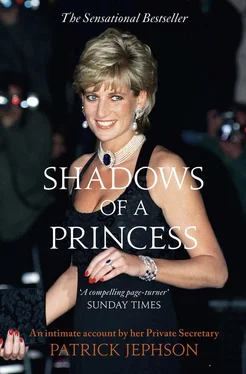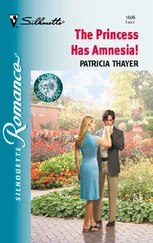‘You’re going to be very late!’ the comptroller snapped at me and I returned fretfully to my lane, trying to look blasé on the outside while feeling like an incompetent sheepdog on the inside.
I went to explain the problem to the Prince’s equerry. Once again demonstrating that alarming ability which all royal people seemed to possess, the Prince overheard our muttered conversation, taking place some 20 feet behind him. ‘I didn’t know it was a race .’ The words were flung peevishly over his shoulder.
Immediately I relaxed, reminding myself once again of that saying attributed to Balfour: ‘Nothing matters very much, and very few things matter at all.’ It was a piece of wisdom I sometimes wished had been carved in illuminated letters 10 feet high across the whole facade of Buckingham Palace. It was a valuable lesson, and one which the Prince had evidently learned many years before, at least in relation to garden parties. I duly received a black look from the comptroller for spoiling the perfection of his arrangements, but he recognized the notorious independent-mindedness of the Waleses and was in any case already thinking about tea; and so, soon afterwards, was I.
Hot on the heels of the garden party came another set-piece event at which the aim of portraying our household as one big happy family came rather closer to success. This was the annual Highgrove staff barbecue. Awnings were pitched on the Highgrove lawn, external caterers were brought in with superior bangers and steaks, and the Prince and Princess vied with each other to play gracious and relaxed host to their hundred or so staff and their guests.
The Princess was in her element. In a casual outfit which looked as though it had come straight from the set of a jeans advert, she worked the crowd as if this were a superior sort of walkabout. Most of the faces were familiar to her, of course. I watched as she adjusted her demeanour according to whether she pigeonholed the person she was speaking to as (1) friendly and therefore deserving proprietorial in-humour, or (2) potentially hostile and therefore marked down for commiserating good humour, on this occasion anyway, or (3) neutral between the two camps. For those in the last category she reserved her most winning smile of all.
Everyone seemed to be hyped up – the employees because their pleasure at feeling they were getting something from the management for free was moderated by the knowledge that they were still under royal surveillance, as they consumed as much food and drink as they decently could. They were also, in many cases, showing off for the benefit of their guests, who were either partners or family. For their part, most of the guests were overawed by being welcomed to Highgrove, which they knew was first and foremost a private residence. The Princess was vigorously marshalling her support and I, for one, was keeping a watchful eye on the progress of her own version of an internal MORI opinion poll. The only person who seemed truly relaxed was the Prince, not least because the event gave him another opportunity to take small groups of reverential employees on guided tours of the gardens which were his consuming interest.
Visiting the house itself on barbecue days was not encouraged, but I had been there often enough before. Engagements that fell on Mondays or Fridays usually began or ended at Highgrove, with an associated trek, inevitably at the worst time of day, along the M4.
It has been said that the Princess disliked Highgrove and my own observations would confirm this, particularly towards the end of the marriage. As has also been said, it was in most ways a typical, comfortable country house with cartoons in the loo, boots in the porch and Jack Russells, it seemed, almost everywhere. It was distinctly more homely than Kensington Palace and certainly, so far as the Princess was concerned, there was no distinction between family and staff areas of the house. When I arrived I might expect to find her perched on the kitchen table, swinging her legs and sharing gossip with the chef, or in the staff hall, listening to the housekeeper’s latest personal crisis.
When the Waleses separated in 1992, the Princess collected all her belongings from the house and quit without much evident regret. No sooner had she gone than comprehensive redecoration took place, together with large-scale purging of the domestic staff. Highgrove then formally became what it had always seemed to be: the Prince’s personal sanctuary and main domestic base. For the Princess’s staff, it became foreign territory overnight. She never returned.
As allegiances in the office and in the country hardened, I found myself firmly in the Princess’s camp. This was not because she was blameless – she could not and did not claim this for herself, as I knew better than most. In fact, she was refreshingly honest about her capacity to run amok in the royal china shop, without ever surrendering her right to do so. ‘Everything’s got to change, Patrick!’ she would say, and I spent a few years trying to translate this aspiration into a reality that was acceptable to the institution and still recognizable to her.
I suppose I supported her because, in the end, she was younger and more naive than her husband was, and ultimately he bore responsibility for what happened in his family. In an organization that had such a highly developed sense of duty, this seemed logical, but I had not even begun to grasp the agony the Prince must have suffered trying to reconcile duty with the demands of the heart. Only now can I hope to have a better understanding of his dilemma.
From this comfortably conceited moral high ground, I felt able in the years that followed to criticize the Prince – if only privately – for failing to break the deadlock with his wife, a move which I knew she would welcome and the country would applaud. As the menace I had seen in him grew in my own mind into a force to be opposed on principle, I believed with righteous zeal that he represented the greater of two pretty unattractive wrongs.
If forced, I would still stand by that assessment, but it is an assessment now tempered by my own experience. All the while I was ministering to the needs of the royal family, I was neglecting those of my own. Ironically, I eventually found myself facing the same doubts about my personal morality for which I had so unhesitatingly condemned the Prince. In my small way, I also faced the opprobrium of observers snug in a moral certainty I could only envy. As my own marriage began to feel the consequences of my strange occupation, I blushed to remember my outrage on behalf of the wronged wife.
Even in what I thought to be the line of duty to the Princess, I cast more than my share of stones at the man I felt was the greater sinner. You may feel, as I do, that it says something about him that he declined to throw them back. Less charitably, you may also feel he had no need, there being plenty of volunteers to undertake such dirty work unbidden on his behalf. Yet in the end it is naive – however superficially justified – to criticize royal people for misdeeds carried out in their name. Being different, if not strictly better than the rest of us, is their raison d’être . Questions of blame also seem to become irrelevant when royalty is concerned for its own survival. All’s fair in love, war and royal service. Many people are attracted to it for that very reason.
As had been proved both at home and in the Gulf, our daily working lives were adapting to the Waleses’ growing estrangement as a matter of professional routine. However, this uncritical acceptance of the facts of life ran into trouble when we had to explain them to others. It was uncomfortable to have to provide for the stark domestic reality behind the public illusion.
One very practical problem arose whenever we were making arrangements for accommodation on overseas tours. We now needed two royal bedrooms. Few hosts were so indelicate as to query this, although raised Embassy eyebrows sometimes had to be stared down. A line suggested for use in these circumstances went something like this: ‘The Prince and Princess often work to different programmes on tour and it makes sense that they – and their immediate personal staff – don’t get in each other’s way when quick turnarounds are required between engagements. This sort of arrangement was perfectly normal for royal people historically and for much the same good reasons. To this day, many couples in the aristocracy organize their sleeping arrangements in the same way. It doesn’t mean they don’t have – and take – the chance to meet intimately when time and inclination coincide.’ In other words, mind your own business – which I, for one, was happy to do. It proved impossible at times.
Читать дальше












